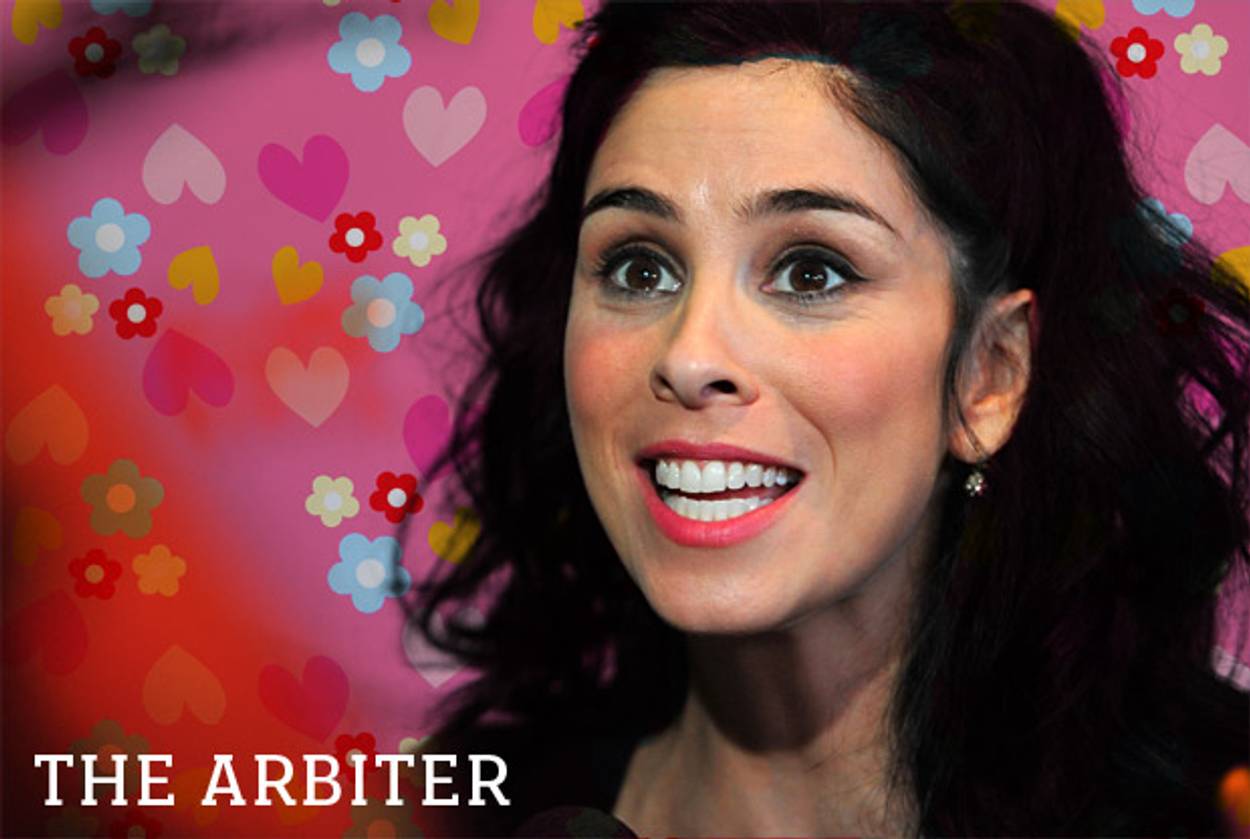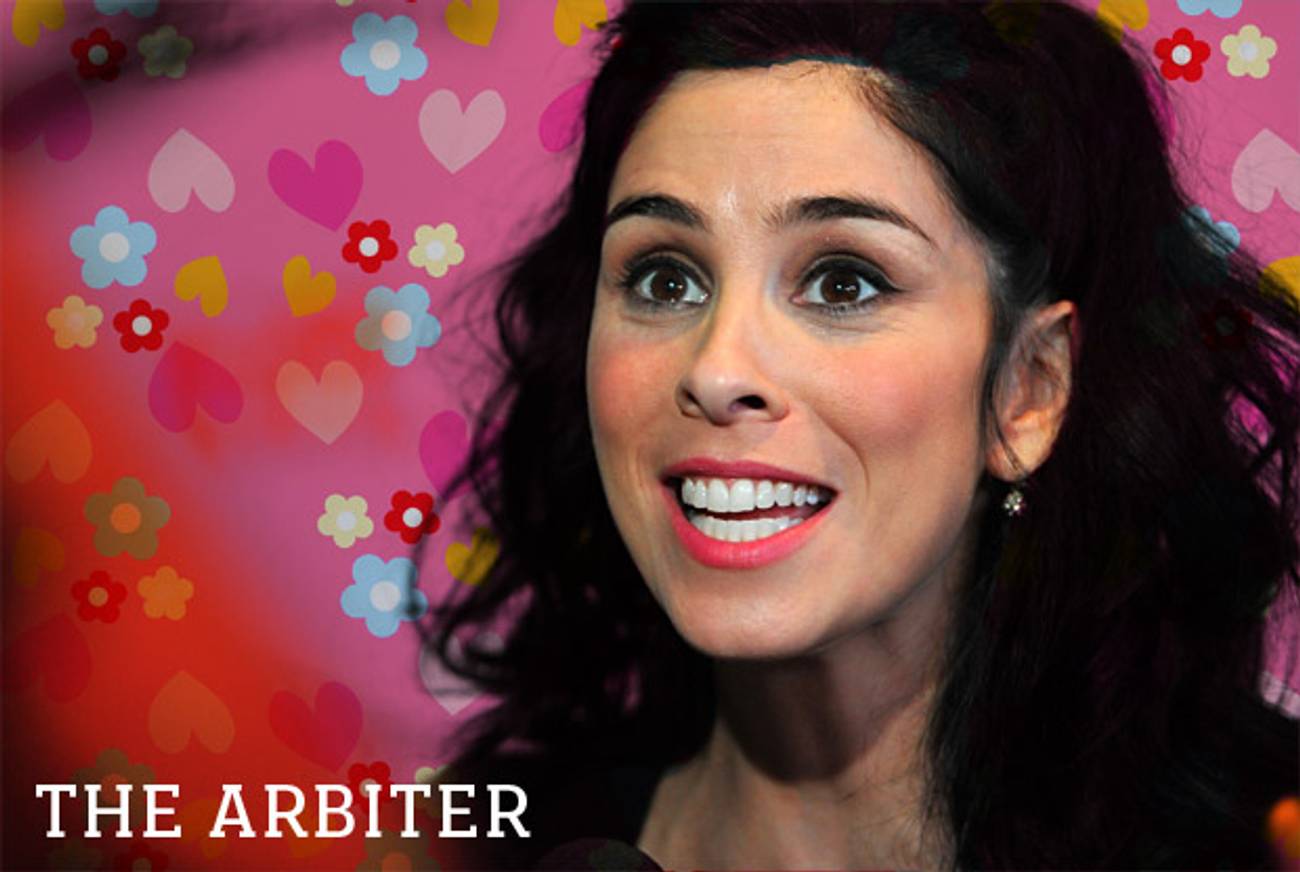Obscenity Charges
Sarah Silverman seemed poised to usher in a new generation of secure, sexual, and powerful female comics. Instead, she went for empty shocks and cheap laughs.




Dear Sarah,
The letter thing works for me because, for some reason, I’ve always had strange feelings toward you, feelings I don’t usually reserve for entertainers, especially ones whose career highs include Greg the Bunny and School of Rock. That’s because ever since I first saw you play Wendy, the disgruntled new writer on The Larry Sanders Show, sometime in the mid-1990s, I thought you had a great chance of becoming one of those very rare and truly important comedians who not only deliver killer lines but also produce the sort of work that is insightful and devastating and that matures, and in special cases can even change the world. Lenny Bruce talked about race when the rest of America was terrified by it, and America laughed and passed the Civil Rights Act.
I was sure, Sarah, that you would grow up and become America’s first female comedian who was powerful as well as sexual and utterly hilarious. Lucy tried, and got spanked. Elayne Boosler tried, and wound up sad and alone in a bar in Chicago, or at least that’s how the comedy industry treated her. Roseanne tried, but being overweight and unattractive cushioned even her meanest and most meaningful blue-collar jokes. All Roseanne could do to really make us mad was grab her crotch while singing the national anthem, and we never really forgave her.
But you had another thing going. You were beautiful and intensely clever, which allowed you to construct this repulsive persona of a privileged, vile woman who distrusts anyone and anything except for her own self-worth. The critic Sam Anderson called this character a meta-bigot and placed you in the company of other mock-ignorant intolerants like Ali G and South Park’s Eric Cartman. He also noted that “unlike other meta-bigots, she doesn’t insulate herself with fictional characters: Her persona—an incestuous, genital-obsessed, racist narcissist—looks and sounds exactly like Silverman herself.”
Anderson is right. And that’s a big problem. As I watched you perform on stage, in movies, and on television these past two decades, I noticed you retreat further and further into shtick, your powers depleted, your promise gone. Jews didn’t find you funny anymore. Women never really found you funny. Post-civil-rights-era comedians are funny because they channel the forbidden Id of the group. So, whose Id are you, anyway?
Consider the following two jokes. Here’s one from earlier on in your career: “I was raped by a doctor, which is so bittersweet for a Jewish girl.” So much violence in so few words against so many sacred markers of identity politics, even if many Jewish girls of my acquaintance actually don’t find rape fantasies funny; they enjoy them.
Women didn’t like you, and you knew it. Men wanted to screw you, and you knew it. You were nasty but confused, and your act lost whatever focus it once had. In a recent comedy concert, you had this to say (I’m paraphrasing here, but only mildly): “What’s the worst thing about the Holocaust? The cost!” At best, this can pass as some weak attempt at sarcasm, but, more accurately, it’s a pun, a verbal non sequitur whose sole purpose is to convert uneasy emotions into easy laughs.
And that, I’m afraid, is your true legacy. Rather than open the door to women comics who wanted to be just as depraved as the boys, you created a new category of stereotype, one that urges the attractive and witty female comedian to retreat as far as she can into mock-cutesy unlikability, to mitigate her libido by laying on the bitterness and the bile, to abandon complex jokes that do real violence against real ills and adopt instead a sort of facile, sophomoric humor that reeks of years spent backstage smoking blunts. This is how you end up with an album filled with song titles like “Will We Eat Each Other’s Doodies?” and “Trimming Your Bush.” This is also how you end up with even blander, more put-together comics like Whitney Cummings, who currently has two network sitcoms and who seems to have begun her career already as a latter-day Silverman, all bark and no bite.
I’m not saying, of course, that you alone are to blame. You work within the system, and it’s not easy undoing decades of discrimination. But Tina Fey’s career is much, much more luminous than yours. Rather than flip the finger at Saturday Night Live for not getting her jokes, she fought uphill until she was the boss and could make cute kissy-faces at her vanquished rivals who once called her “Herman the German.” When she was offered the opportunity to write a memoir, she titled it Bossypants and produced a smart and funny and poignant essay on being a female comic in a male-dominated industry. It’s a book you can imagine may inspire real health-care reform, or at least help a few young girl comedy nerds to overcome their fears and get up on stage and maybe someday become the female Richard Pryor.
Your memoir, on the other hand, was called The Bedwetter. It included a fictional eulogy by God, who mourns your passing by saying: “She loved dogs, New York, television, children, friendship, sex, laughing, heartbreaking songs, marijuana, farts, and cuddling.” It’s the kind of book you can imagine may inspire young girl comedy nerds to say filthy things in a silly voice so that boys will think they’re hot. Daria did it first, and she was edgier and funnier than you are. And she was a cartoon.
These are harsh words, Sarah, but I’m only writing because I hope that there’s a project somewhere in the future, a script or a book or a stand-up show, that would bring back that same brilliant, fearless comic I fell in love with two decades ago, and that you’ll emerge from your scatological skunk-weed haze to once again tell the kind of jokes that people remember long after the fact and that leave us happy and horny and agitated. That, after all, is what comics do, and few can do it better than you when you are on your game, which last happened sometime before George Bush invaded Iraq and Steve Martin became a writer for The New Yorker. Sarah, I still think you’re hot, but I’m begging you: Please try harder.
Love,
Liel
Liel Leibovitz is a senior writer for Tablet Magazine and a host of the Unorthodox podcast.
Liel Leibovitz is editor-at-large for Tablet Magazine and a host of its weekly culture podcast Unorthodox and daily Talmud podcast Take One. He is the editor of Zionism: The Tablet Guide.